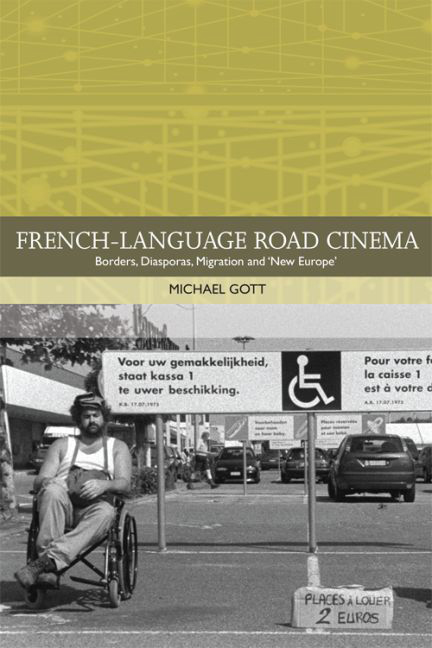Book contents
- Frontmatter
- Contents
- Acknowledgements
- List of Illustrations
- Traditions in World Cinema
- Introduction
- 1 Mapping the Hybrid European Road: French Connections, European Traditions and American Influence?
- 2 Remapping the European Road
- 3 Cowboys, Icebergs, Anarchists and Toreadors: The Paradoxes and Possibilities of the Francophone Belgian Road Cinema
- 4 Travelling Beyond the National: Mobile Citizenship and Flexible Identities in French-language Return Road Movies
- 5 The End of the Road? Dark Routes and Urban Passageways
- Conclusion
- Works Cited
- Index
4 - Travelling Beyond the National: Mobile Citizenship and Flexible Identities in French-language Return Road Movies
Published online by Cambridge University Press: 12 September 2017
- Frontmatter
- Contents
- Acknowledgements
- List of Illustrations
- Traditions in World Cinema
- Introduction
- 1 Mapping the Hybrid European Road: French Connections, European Traditions and American Influence?
- 2 Remapping the European Road
- 3 Cowboys, Icebergs, Anarchists and Toreadors: The Paradoxes and Possibilities of the Francophone Belgian Road Cinema
- 4 Travelling Beyond the National: Mobile Citizenship and Flexible Identities in French-language Return Road Movies
- 5 The End of the Road? Dark Routes and Urban Passageways
- Conclusion
- Works Cited
- Index
Summary
Films covered: Voyage en Arménie/Armenia (Robert Guédiguian, 2006, France), Ten'ja/Testament (Hassan Legzouli, 2004, France/Morocco), Comme des voleurs (à l'est)/Stealth (Lionel Baier, 2006, Switzerland)
In 2011 Cahiers du Cinéma devoted an entire issue to the recent tendency in French cinema to view France itself as an object of interest. From regionalism to immigration, from the colonial heritage to contemporary citizenship, Stéphane Delorme identifies the rise in the past ten years of a veritable obsession with France and its inhabitants, in and beyond cinema (2011). Over the same period, and looking back a bit further to the mid-1990s, the road movies that this book is concerned with have been plying similar terrain. As I have argued in previous chapters road cinema has become an increasingly popular vehicle for filmmakers attempting to come to terms with the complexities of contemporary identity within France and Belgium – both particularly rich case studies – but also within ‘New Europe’ and a postcolonial world. A close look at the corpus of French-language road cinema of the past twenty years reveals a genre that actively reformulates the limits of national and European identity by (often literally) redrawing the map. As is common in road cinema, this concern for home – whether it be France, Belgium or Switzerland – is translated into voyages beyond the boundaries of protagonists’ home nations. Hitting the road has allowed directors of diverse origins and backgrounds to re-imagine boundaries and transcend the typical spatial signifiers that dominate political, cultural and media debates. Within the context of ‘return’ films in in particular, what is called into questions are binary distinctions between local and global, home and away, and cultural identities linked to ‘home’ and ‘host’.
If Cahiers de Cinéma opted for a white silhouette of France on a black back-ground for the cover of its issue, I will argue here that the return road movie opens the door to a reading of contemporary national identity as a flexible concept not strictly delimited by the geographic boundaries of the nation-state. At the same time, nor are identities aligned with the ethnic or cultural origins of the protagonists. Put differently, ‘return’ films complicate simplistic notions of home that would align that concept uniquely with origins or be defined by assimilation.
- Type
- Chapter
- Information
- French-language Road CinemaBorders, Diasporas, Migration and 'New Europe', pp. 118 - 147Publisher: Edinburgh University PressPrint publication year: 2016



